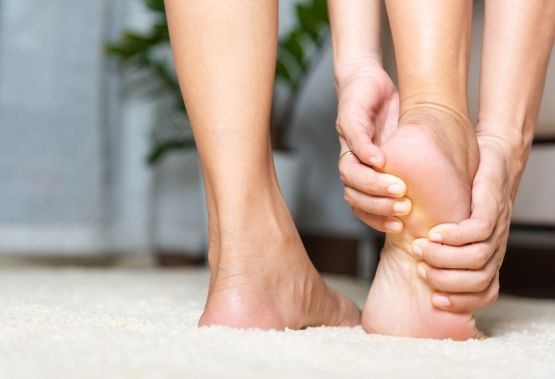Living with peripheral neuropathy
Having neuropathy means living with a debilitating condition that causes discomfort and symptoms like chronic pain, mobility and coordination problems, as well as fatigue and muscle weakness. All of these can affect the patient's normal life in various ways, making proper diagnosis and treatment crucial to improving quality of life.
At Turó Park we are committed to the patient's wellbeing so we offer support from neurology specialists to diagnose and find a tailored treatment plan for each patient.
What is the term neuropathy?
Neuropathy is the term for a group of disorders that affect the peripheral nervous system, i.e. the nerves outside the brain and spinal cord. These damaged nerves are responsible for transmitting sensory and motor signals between the central nervous system and the rest of the body. When damaged, they can cause symptoms such as pain and coordination problems.

Types of neuropathy
It is the most common type and is characterised by impairment of the nerves in the limbs, i.e feet, legs, hands and arms. The most common symptoms are numbness in the feet, tingling or burning sensations, chronic pain and hypersensitivity to touch in the limbs and muscle weakness. In severe cases, there is loss of reflexes and more serious problems such as ulcers and deformities.
It affects the nerves that control involuntary body functions such as blood pressure, digestion, sweating, bladder and others. It can cause symptoms such as frequent urinary tract infections, digestive problems, problems regulating body temperature, heart and artery problems as well as sexual difficulties in men and women.
This type of neuropathy affects only one specific nerve, either in the face, arm, torso or leg. It is more prevalent in older people and usually appears suddenly. Paralysis on one side of the face, difficulty in vision or pain in the limbs are the most common symptoms and fortunately, the symptoms usually improve over weeks or months.
This type is common in people with type 2 diabetes or in older people. It is characterised by affecting the nerves in the hips, thighs, buttocks or legs. Symptoms usually affect only one side of the body but can also extend to the whole body. Because of the location of the affected nerves, the symptoms are pain and atrophy in the legs, hips, buttocks and stomach pains.
What are the causes?
- Diabetes: probably the most common cause. More than 50% of people with diabetes develop some form of neuropathy.
- Infection: either bacterial or viral, such as HIV, hepatitis C and Lyme disease.
- Autoimmune disorders: such as lupus, Guillain-Barré syndrome and others. Some cancers of autoimmune nature can also lead to the development of neuropathy.
- Benign and malignant tumours: depending on the location, they can press on or even grow into nerves thus causing neuropathies.
- Genetic diseases: such as Charcot-Marie-Tooth disease, which involves an inherited form of neuropathy.
- Chemotherapy: not always, but some cancer treatments can cause peripheral neuropathy.
- Pressure on nerves: injury from a severe fall can easily damage peripheral nerves. Likewise, pressure on nerves from using crutches or having a cast can result in neuropathy.
How do you diagnose neuropathy?
The diagnosis of neuropathy involves a combination of tests and studies to determine possible triggers that have gone unnoticed and to asses the state of the peripheral nervous system.
The specialised neurologist in Turó Park Clinics will:
- Evaluate the medical history and perform a physical examination to assess the severity of the symptoms.
- Make the corresponding prescription for a blood test to detect possible causes such as diabetes or vitamin deficiencies.
- Electromyography (EMG) tests and nerve conduction studies will be done to measure electrical activity and the speed of that activity.
- In some cases, a complementary test may be performed, which involves taking a sample of the nerve for biopsy.
What treatments are available?
With the right treatment, neuropathy can be managed and made more manageable, thus improving the quality of life for sufferers, nevertheless, treatments do not completely eliminate symptoms.
- Medications - are recommended to control pain and reduce inflammation.
- Physiotherapy - is highly recommended for neuropathy that causes mobility problems, as it can significantly improve muscle strength and-equality.
- Controlling the cause - in the case of diabetes, alcoholism or nutritional deficiencies, it is important to manage and correct habits that can worsen neuropathy.
- Surgery - is used in cases of nerve compression, such as to correct carpal tunnel syndrome.
Our tips for neuropathy prevention?
Practice healthy habits such as:
- Maintaining a balanced diet with vitamin-rich foods
- Regular exercises
- Avoiding alcohol and other toxins
- Control underlying causes such as diabetes
- Follow your doctor's recommendations
Your health is our priority!
Our neurology department welcomes you for the diagnosis and treatment of neuropathy.

Our specialised neurologist
